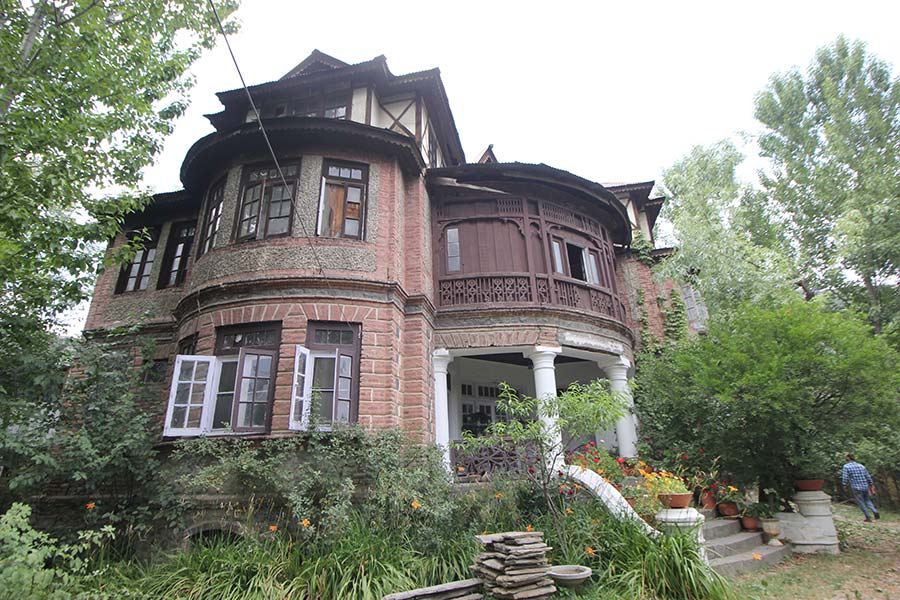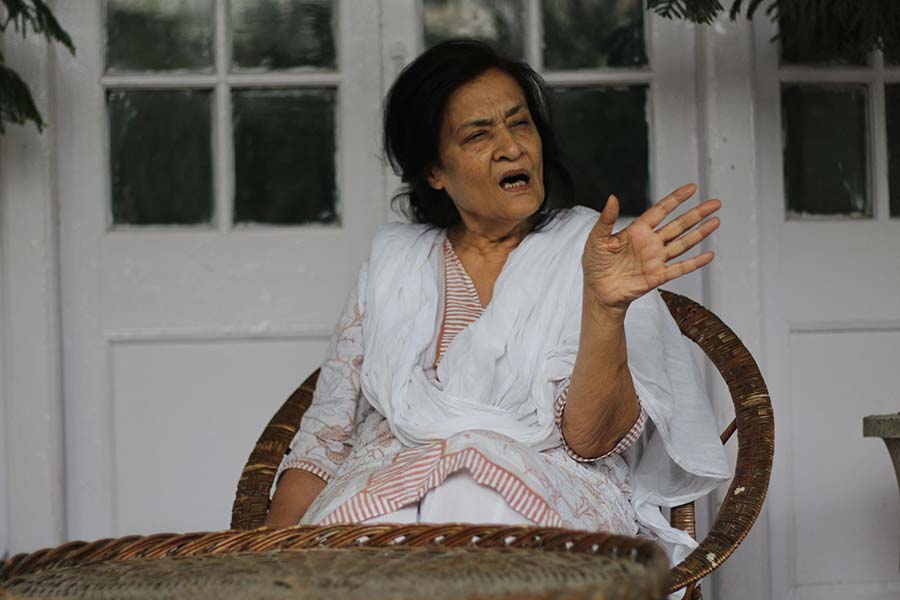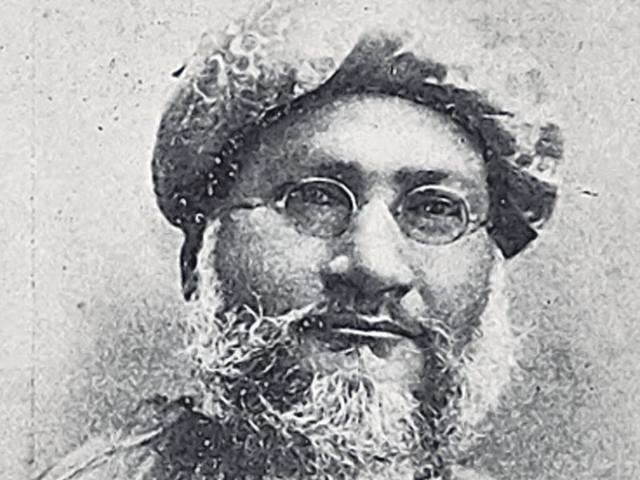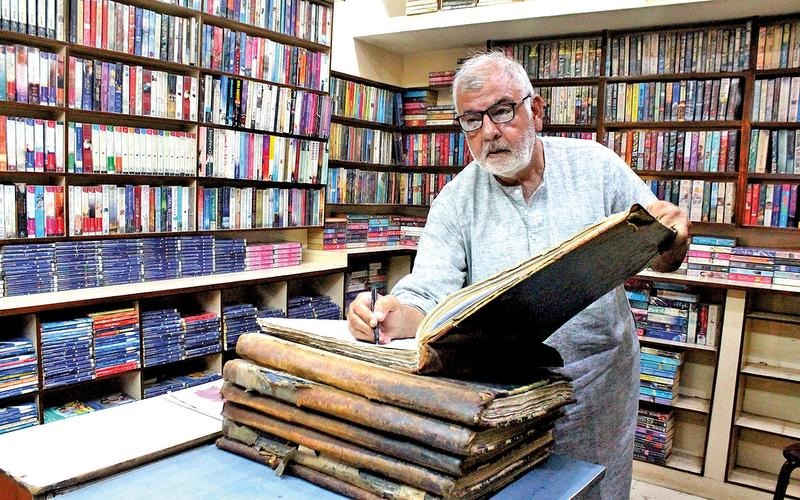JAMMU & KASHMIR :
Started by a mother of seven to impart free education to underprivileged, Buchwara’s Lowood School is now a splendid piece of history. To rediscover its history, Bilal Handoo visits the school where once elite and influential British used to teach

Address of the yesteryear’s educational signpost in Buchwara is a flood-torn fence and moss-filled courtyard of a rundown Dogra era building. For the moment, the structure appeared haunting: hauntingly quiet amid absence of mortals. The first sign of life came when a senile yet warm lady showed up only to recount how the school created a difference in its immediate locality.
Arjumand Zafar basked under the afternoon sun before narrating some unknown facts about the school. “Do you know,” says Arjumand, a retired deputy health director, “who used to teach here?” She rushed to solve the riddle, “the only daughter of former Prime Minister of England, Carol Thatcher.” She reclined on her seat to recall those two successive summers in later seventies when Carol Jane Thatcher (63) – an English journalist, author, and media personality arrived in Lowood School Buchwara and taught the students.
Then, the young Arjumand saw the daughter of the “Iron Lady”—Margaret Hilda Thatcher—a British stateswoman and the longest-serving British Prime Minister of the twentieth century, Prime Ministyer of the United Kingdom from 1979 to 1990, to teach the kids with zeal. “She used to stay with us during that time,” the lady, now living in the house with her domestic help, said. “It was a different era, when foreigners used to frequent the school to prepare students over here at par with global standards.” Carol was then working for Australian Sydney Morning Herald whose relationship with Jonathan Aitken had ended in 1979. Now living with ski instructor Marco Grass in Klosters-Serneus, Switzerland, Carol travelled to the Falkland Islands and Argentina for the documentary Mummy’s War, where she got the hear: “Your mother is a war criminal!”.
But who was running this school and inviting all those high-profile foreigners back there? That person was Arjumand’s mother-in-law, the famous and respected Barkat Begum.
Also known as Begum Rehana Jalal-ud-din (Feb 13, 1913-April 13, 2002), Barkat Begum originally hailed from the remote Karen belt. Her family members distinguished themselves in various fields in valley. Her eldest brother, Nazir Ahmed Shah, was a judge. Her other brothers and sisters include, Begum Me’raj Qureshi (educator), Syed Ahmed Shah (nicknamed Shamji, a decorated member of the Kashmir Armed Forces, and founding member of the JAKLI Regiment, and later the JK Police), noted physician Dr Sayed Naseer Ahmed,, Syed Zameer Ahmed (former member of the armed forces, and an entrepreneur) and Dr Mahmuda Ali Shah, an educator.
Married to Aga Jalal-ud-din, an officer in the Maharaja Hari Singh’s Forestry Department at a young age, she continued her schooling with support from her “loving” husband. She was one of the few Muslim women from Kashmir to pursue further studies abroad, when she was awarded a scholarship to study at the University of Chicago in the 1950s. She was a mother of seven when she travelled to America for studies.
On her return, she dedicated her life to develop school education in J&K, first as an officer in the government, and on her retirement, by founding one of the few English Medium schools in the valley, the Lowood Garden School. Her legacy of education is instilled deeply in her children, who have also excelled in their respective fields of expertise: son Syed Aga Nasser, retired as a senior member of the state judiciary; daughter Amina Gran, linguist, and broadcaster who worked with the UN; daughter Begum Khurshid Bakshi – wife of former Prime Minister Bakshi Ghulam Mohammad, educator and social worker, who retired as Director, Social Welfare son Zafar Ahmed, engineer and poet, retired as Chief Engineer Works; daughter Begum Sughra Hafeez, who retired as Principal, Government College for Women, Srinagar; son Shams Ahmed Khan, IPS, who retired as Inspector General of Police, JKP; daughter Begum Qudsiah Shah, educator who retired as Principal, Kothibagh Girls Higher Secondary School, Srinagar.
While her maiden name was Rehana, she was known and respected as Barkat Begum, a reference to her untiring efforts for the social and educational upliftment of the under-privileged. To her extended family she was known simply as Begum.
Barkat Begum worked tirelessly to promote social and educational upliftment, to the extent of refusing to accompany her husband back to Lahore after Partition as she felt that her services to promote education among women in Kashmir were more important.
Passion for education led this lady from a conservative background to travel alone to Chicago on a steamer in the 1950’s to pursue a scholarship leaving behind seven young children in the care of relatives. Uncommon even today, such an endeavour would have been unthinkable for a lesser mortal in those days.

After retirement Barkat Begum set up one of the finest schools in the valley – the Lowood Garden School. A dedicated core of teachers was supplemented by anyone who had something to teach. Visiting tourists and school-going grandchildren were co-opted into impromptu teaching roles. Barkat Begum was not one to be easily refused.
Many foreigners would return to take up temporary teaching assignments and school activities included stuff like performing Shakespearean plays and nature interpretation. Her family lived in a colonial bungalow on the Boulevard Road, which also housed the Lowood Garden School. The property included a huge estate with marshes, reed-beds and walnut, apple and quince-apple orchards. When Sheikh Mohammed Abdullah, then Chief Minister of Kashmir, offered Barkat Begum a permanent house in exchange for releasing the estate to build a commercial complex, she offered to release the land without any compensation if the state needed it. ‘Aap ki Jooti ki khairat’ was the term she used, translated roughly that the land meant less to her than the worth of his sandals.
The high worth of education and service for the common good as opposed to chasing wealth are values that were deeply instilled in her children and grandchildren. “I often joke that if Bill Gates were to meet my mother’s family,” says Jehangr, Barkat’s grandson, “they probably would treat him like a common shopkeeper. They don’t make them like her anymore!”
The school had a concept of mid-day meals when it was the remotest concept. They would give students a peanut butter. “The grandma was topper in Chicago examination,” says Javed Bakshi, son of Bakshi Ghulam Mohammad, who heads J&K’s State National Rural Livelihood Mission (SNRLM). “She was part of Chicago based firm that used to supply stationery to the school.”
Eighty percent of pass-outs from Lowood School are either doctors, engineers and lawyers, Javed says. “One Khurshid Mir, pass-out of the school, now runs 20 spice shops in Germany,” he says. “His father is still selling cigarettes on Dal Lake gates. He flew all the way from Germany to be the part of my grandma’s funeral and broke down saying that today’s whatever little he achieved in life is all because of Barkat Begum.”
Begum Jallal-ud-Din not only had Master’s degree from Chicago University (USA) in 1940, but was also the first Asian to get cent percent marks in the course and later retired as Director Social Welfare here. Her father was a forest lessee, a big business during Maharajas time in Kashmir. “Despite holding high positions, none of the siblings had a house of their own and used to stay in the custodian house,” recalls her elder son, Javid Bakshi. “The (siblings) have been brought up in lot of poverty. Her father’s family went back to Pakistan after the partition in 1947. Her mother had gone out to study in Chicago (1946-47), and due to transition period she (grand mom) couldn’t even send money to the family here as something happened with the currency those days. So the siblings living in Kashmir used to for themselves. So many times, they would not have bedding to sleep and majority of the times siblings would skip dinner.”
In 1970, in Buchwara, Mummy used to go house to house walking to motivate parents to send their daughters to Low Wood School” a middle private school, sponsored by government. This was the same school that my grandma opened up after her retirement. Now my mother was teaching after her retirement. She ensured a good number of girls in the school. Those days, the school had American style of mid-day meals. Early morning, raspberry jam, a big glass of milk, oats, eggs, were served to kids. Students used to get free education, and the kids who couldn’t afford uniform, would get it from school. “Kids in the school were mostly from the boatmen community.”
Bashir Sidiq, a member of Kashmir Bar Association is one proud student of Barkat’s School. “We were like her sons,” Sidiq says. “Barkat Begum used to teach us in garden and prepared us for the overall development of life. She was focussing on underprivileged kids and was very health conscious.”
source: http://www.kashmirlife.com / Kashmir Life / Home / by Kashmir Life / September 28th, 2017















